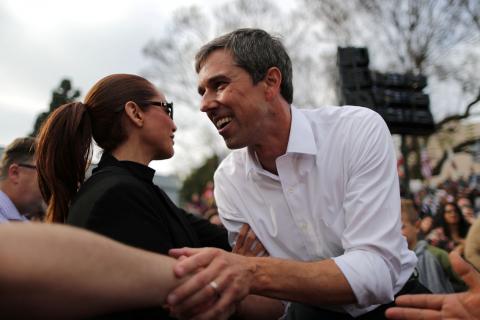Advertisement
Democratic presidential candidate O'Rourke lays out $5 trillion climate plan
(Reuters) - U.S. presidential candidate Beto O'Rourke on Monday laid out one of the most detailed climate policies so far in the crowded Democratic field, calling for a $5 trillion investment in clean energy technology and infrastructure over 10 years with a goal of reaching net-zero emissions by 2050.
O'Rourke, the former Texas congressman, made climate change the focus of his first major policy announcement, unveiling the plan ahead of a campaign stop meeting with scientists at the iconic Yosemite National Park in California.
"The greatest threat we face — which will test our country, our democracy, every single one of us — is climate change," O'Rourke said in a statement.
The plan lays out a series of executive actions that would reverse the "energy dominance" policies of President Donald Trump, who has been rolling back environmental regulation to increase domestic fossil fuels production.
O'Rourke's measures include U.S. re-entry into the Paris Climate Agreement, ordering a reduction in methane emissions from oil and gas operations, halting new drilling leases on federal land and restoring pollution standards for power plants.
His plan also calls for raising taxes on the wealthy and on corporations to help fund some $5 trillion in projects to modernize infrastructure and clean energy technology over a decade.
The net-zero goal in O'Rourke's and other climate plans means reducing carbon dioxide and other greenhouse gas emissions 100 percent or offsetting them by as much as is emitted.
"The bill will be funded with the revenues generated by structural changes to the tax code that ensure corporations and the wealthiest among us pay their fair share and that we finally end the tens of billions of dollars of tax breaks currently given to fossil fuel companies," O'Rourke's legislative proposal states.
The plan appears to align with some of the principles of the Green New Deal, a bold set of policy goals introduced by congressional Democrats, that would transform the U.S. energy economy to 100 percent renewable sources by 2030, using federal funds to invest in modern infrastructure and green job programs.
Most of the Democratic presidential candidates, including Bernie Sanders, Kamala Harris and Elizabeth Warren, have embraced the Green New Deal, which has become a focus of attacks by the Republican party, which calls it unfeasible.
Other candidates have announced some specific policy measures related to climate change and the environment in recent weeks, and Warren has unveiled a public lands policy that would ban new drilling and mining leases on federal lands.
Environmental group the League of Conservation Voters on Monday praised O'Rourke's plan, saying that it offered "the kind of leadership we need from the next president."
Still, the upstart Sunrise Movement, the youth-led group that has pushed the Green New Deal into the spotlight, said O'Rourke's plan fell short of what they said scientists said was necessary to fend off the worst impacts of climate change.
The Green New Deal calls for achieving net zero emissions within a decade, not by mid-century, as O'Rourke's plan sets out.
"Beto claims to support the Green New Deal, but his plan is out of line with the timeline it lays out and the scale of action that scientists say is necessary to take here in the United States to give our generation a livable future," said Sunrise founder Varshini Prakash.
(Reporting by Valerie Volcovici; Editing by Tom Brown)



















Add new comment